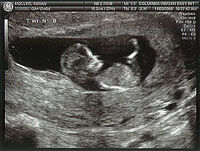Down Syndrome[]
Down Syndrome (DS), also known as Trisomy 21, is a condition where a child has an extra chromosome 21 which delays mental and physical development. The severity of Down Syndrome can vary from child to child, some may live relatively normal lives while others need a lot of medical attention. Down Syndrome, a genetic disorder, can be detected before the baby is born, but it can not be prevented. Trisomy 21, the most common form of Down Syndrome, is caused by abnormal cell division in either the egg or sperm. It will affect about 1 in 800 babies.
Symptoms of Down Syndrome[]
The symptoms of Down Syndrome can range from mild to severe, some may be physical while others are mental.

Single crease of the hand, a symptom of Down Syndrome

Brushfield spots
Common physical signs include:
- Flattened nose
- Sutures - separated joints between the bones of the skull
- Single crease in the palm of the hand
- Small ears and/or mouth
- Decreased muscle tone at birth
- Excess skin at the neck
- Upward slanting eyes
- Wide, short hands with short fingers
- Brushfield spots - white spots on the colored part of the eye
Most children with Down syndrome do not reach average adult height. Children can also have delayed social and mental development. Common behavorial problems may include:
- Impulsive behavior
- Short attention span
- Slow learning
- Poor judgment
Children with Down Syndrome can become aware of their limitations due to the disease, this can lead to them feeling frustration and anger.
Detection of Down Syndrome[]
During Pregnancy[]
There are two kinds of diagnostic testing which can be done during pregnancy, amniocentesis and chronic villi sampling. These two tests are not required during pregnancy but if a woman wishes to have those tests then it is highly recommended th

An example of an ultrasound
at she see a genetic counselor to learn about the risks and benefits of having such a procedure. Both tests will result in a picture of the chromosomes of the fetus so Down Syndrome can be easily diagnosed, because an infant with Down Syndrome will have a total of 47 chromosomes, rather than the usual 46, for they will have an extra chromosome 21.
There are also two kinds of screening tests which can be done during pregnancy, ultrasound and maternal serum screening tests. The two tests can not diagnose Down Syndrome, but they tell if an infant has a higher risk of having down syndrome. Ultrasounds, or sonograms, uses sound waves during pregnancy and can show some signs of a possibility of Down Syndrome. Maternal serum screening tests can be conducted on the mother's blood because the mother and fetus share a circulatory system. The test, done during the first or second trimester, measures substances made by the fetus in the mother's bloodstream. The test can estimate the risk for the baby to have Down Syndrome.
After Birth[]
At birth, the doctors will check for physical characteristics indicating Down Syndrome. If certain traits are observed, t

Presence of Trisomy 21 in a karyotype
he doctors will order a chromosomal karyotype to check for the presence of trisomy 21.
Treatment[]
There's no treatment for Down Syndrome, but it is important to monitor other problems because people with Down Syndrome have a higher risk of developing other problems, such as sleep apnea and cataracts. People with Down Syndrome should undergo routine checkups to prevent diseases associated with Down Syndrome. Children with Down Syndrome will have a difficult time becoming independent and self-sufficient, so certain therapies can help them develop life skills. For example, speech therapy can help children learn necessary skills. Because they are at a higher risk for obesity, a registered dietician can help create diet and exercise plans to help maintain a healthy weight. Doctors and counselors can help improve behavioral and social problems. A child with Down Syndrome may have a difficult time coping with change or loss and a therapist could help them through these changes.
Life Expectancy/Quality of Life[]
More than half the people diagnosed with Down Syndrome live into their 50s. Only about 15% live past 68 years of age. About half of the people born with Down Syndrome also have heart and/or gastrointestinal problems, which can lead to an early death. People with Down Syndrome can still live fulfilling and relatively long lives. With the help of certain medications and therapies, people with Down Syndrome can live independently.
Different Types of Down Syndrome[]
Trisomy 21 is the most common form of Down Syndrome, but there are also two other forms of Down Syndrome. Mosaic Down Syndrome is caused by a mix of normal cells and cells with Trisomy 21. Translocation Down Syndrome is caused when a part of chromosome 21 becomes translocated, or attached, to another chromosome.